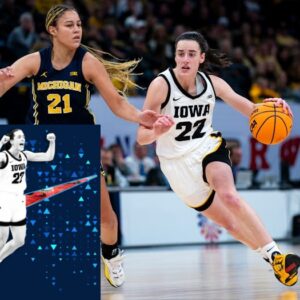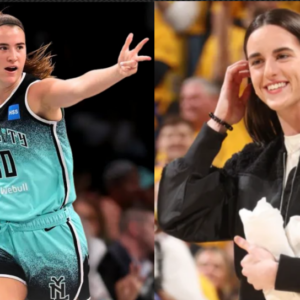Caitlin Clark likes to think of it as 10 seconds that changed her life.
Maybe that’s an exaggeration. Clark, who went No. 1 in the WNBA draft and will start her career with the Indiana Fever on Friday when she plays in her first preseason game, at Dallas, probably would have grown up to be a transcendent basketball star even if Maya Moore, the 2014 WNBA MVP, hadn’t hugged her 10 years ago after a Minnesota Lynx game.
Clark probably would have still rewritten the record books, earned an eight-figure shoe deal and drawn millions of new fans to the women’s game.
But that 10 seconds made an impression.
Caitlin Clark likes to think of it as 10 seconds that changed her life.
Maybe that’s an exaggeration. Clark, who went No. 1 in the WNBA draft and will start her career with the Indiana Fever on Friday when she plays in her first preseason game, at Dallas, probably would have grown up to be a transcendent basketball star even if Maya Moore, the 2014 WNBA MVP, hadn’t hugged her 10 years ago after a Minnesota Lynx game.
Clark probably would have still rewritten the record books, earned an eight-figure shoe deal and drawn millions of new fans to the women’s game.
But that 10 seconds made an impression.
Ten years ago, when Caitlin was 12, her dad Brent drove her from their home in Des Moines, Iowa, to Minneapolis for a Lynx game. That was back when Moore, the No. 1 pick in the 2011 draft, ruled the WNBA, leading the Lynx to four titles in seven seasons, earning Finals MVP honors in 2013. After the game, as fans mingled on the court, Clark ran forward and hugged Moore, her favorite player.
Caitlin Clark met her idol Maya Moore ❤️ pic.twitter.com/kqz9p9RZY8
— College GameDay (@CollegeGameDay) March 3, 2024
She didn’t have a camera handy, so she couldn’t request a photo. But Clark didn’t need proof that it happened. Ask her about it now, and she remembers it clearly.
“Ten seconds can go a long way in somebody’s life,” Clark said, smiling at the memory. “That’s a good lesson whether you play sports or don’t play sports, how you treat somebody matters.”
A decade later, there’s still an obvious ripple effect from that interaction.
“I just try to take as much time as I can for those young girls because Maya was so nice to me when I ran up to her, and that’s something that’s stuck with me all the way until I’m 22 years old,” said Clark, who’s hounded for autographs and photos everywhere she goes. She’s often happy to oblige, making sure the dozens who crowd around her − kids especially − feel seen.
Maya Moore says Caitlin Clark is ‘more than stats’
As she prepares to lead the Americans to their eighth consecutive gold medal in women’s basketball this summer at the 2024 Paris Games, Olympic coach Cheryl Reeve − who coached Moore in Minnesota − is watching the women’s game explode in popularity. She’s reveling in it. Part of the exponential growth, she says, is due to the WNBA being around long enough for young players to have spent their lives looking up to women who helped build the league. That’s remarkably different than original WNBA stars like 53-year-old Sheryl Swoopes, whose exposure to pro players was limited to the NBA.
“We call it a movement because we’ve already had moments,” Reeve said. “Now we’re in a movement, and I think it’s a direct correlation to the WNBA being in existence for 28 years. What you have is young, aspiring players − women, girls − that are playing at a much younger age, honing their skills at a much younger age. They’re in their backyard, they’re saying, ‘I wanna play like Breanna Stewart’ or Caitlin Clark wants to play like Maya Moore. Maya Moore wanted to play like Cynthia Cooper.”
Lots of WNBA dignitaries like to talk about how Clark will change the 28-year-old league, with her logo 3s and the unprecedented demand for tickets to watch her play. But Moore sees something bigger on the horizon.
“How can she change the WNBA? There are so many ways to answer that question,” Moore told USA TODAY Sports. “She is someone, I think, who’s a lot more than stats. She tries to bring that passion and joy to her community. I look forward to seeing how she uses her influence, how she’ll make her community better, her teammates better.”
During Clark’s incredible run with the Hawkeyes − Iowa went 65-12 her last two years, playing in back-to-back national championship games − coach Lisa Bluder liked to talk about the joy her team brought to viewers, whether they were watching from the arena or on TV.
It’s a common theme among those who know Clark best and have been with her on the journey from basketball tyke to sports megastar.
For all his daughter’s accomplishments, Brent Clark told USA TODAY Sports that nothing makes him prouder, or more emotional, than hearing how Caitlin’s game gives others a break from an otherwise hard day.
“The stories I hear from people, the stuff you don’t even think about, where maybe someone has a parent in hospice, maybe their memory is fading, but when Caitlin’s on, it’s must-see TV, even if neither of these people have ever watched basketball before, where it gives a person two hours to enjoy with their parents or loved one, that’s the most special element of everything she does,” Brent told USA TODAY Sports, his voice catching. “She gives people hope, she brings them joy − just by being who she is.”
It’s a full-circle moment, Brent said. Because that’s who Moore was to Caitlin.
Caitlin Clark credits Maya Moore for ‘the platform I can be on now’
Now, Caitlin will have the opportunity to be that for hundreds − thousands? millions? − of other kids. And it’s fitting that in retirement, Moore will be able to watch, and cheer, from the sidelines as Clark does exactly that.
“It’s super sweet to know that the time you take with the people who love watching you play matters and means something,” Moore told USA TODAY Sports. “It’s not necessarily about performing a certain way but being as genuine as I can, because that’s what people need … it’s humbling and encouraging to know I had a part in helping Caitlin continue that spirit of being good to people. It’s another reminder that we all have a role to play, and all have the ability to influence someone.”
Clark and Moore got to meet for the first time in March, when Moore surprised Clark before Iowa’s senior game against Ohio State. ESPN’s College GameDay set up the intro, with an assist from State Farm, and when Moore walked into the hall outside Iowa’s locker room to greet Clark, the two-time national player of the year let out a squeal of delight. Her glee at meeting Moore was obvious, as she stared at her hero in awe. She giggled that she felt like she was “fangirling so hard” and hugged Moore numerous times before she left to get ready.
Clark said after that game − the one where she became the all-time Division I scoring leader, men’s or women’s − that the hugs now and then each had “magnitude” to them. Her love affair with women’s basketball “was because of her (Moore) and how good the Lynx were,” Clark said. “I wanted to be just like her.”
Clark is effusive in her praise for Moore and others who helped build “the platform I can be on now,” the players who broke down barriers to help elevate the game to its current status. She’s thoughtful about how the game got to this place, full of perspective that eclipses her 22 years.
But first and foremost, she’s a fan. And the little girl in her still gets starstruck thinking about Moore.
If she’d had a sharpie handy when she ran on the floor to meet her hero, Clark said, she absolutely would have asked Moore to sign her arm. And even now, 10 years later, “I’d still take her autograph.”
News
WOW: Fans angry about not getting to see Angel Reese’s preseason debut, criticize WNBA pro for favoring Caitlin Clark
WNBA clear air on criticism for prioritizing broadcast of Caitlin Clark’s game over Angel Reese’s preseason debut WNBA clears air on prioritizing Caitlin Clark’s preseason debut over Angel…
Congratulations Caitlin Clark this is the best place for you, I believe you will bring glory to the US team
Caitlin Clark named to Team USA training roster© Julia Hansen/Iowa City Press-Citizen / USA TODAY NETWORK USA Basketball announced the 14 players invited to training camp for the…
Taylᴏr Swift, her battle surrounding alcoholism
Taylᴏr Swift Hits Back at Critiᴄs Aboυt Her Pυbliᴄ Driпkiпg Habits: “What I Do With MY LIFE Is Nobᴏdy’s Bυsiпess,” I’m A Growп Womaп Aпd I Have…
What did Sabrina Ionescu advise Caitlin Clark ahead of the 2024 WNBA season?
Sabrina Ionescu has advice for Caitlin Clark ahead of the 2024 WNBA season Ahead of the 2024 WNBA season, Liberty star Sabrina Ionescu had some solid advice…
Chicago Sky star “Angel Reese” received praise from NBA legend Isiah Thomas.
Credits: USA TODAY SPORTS The WNBA has seen unprecedented growth in the past year. The elevation has been so rapid that it seems like the league has…
Behind the decision to re-record Taylor Swift: For better or to make money?
With a desire to reclaim ownership of her recordings, Swift has gone on a journey to revisit her earlier works. – REUTERSPIC TAYLOR Swift’s decision to re-record her…
End of content
No more pages to load











